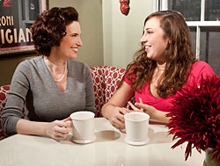Spoken with Feeling
Cancer is a difficult diagnosis to acknowledge — especially what a parent with cancer must explain. A StoryCorps project to capture the emotional stories of survivors may help others say what must be said.
BY Holly Edmiston
Kathy Ferrara knows how difficult it can be to tell children about one’s own cancer diagnosis. Two years ago, Ferrara, then 42, was diagnosed with Stage II colon cancer. At the time, her three children were ages 18, 16 and 13. Having lost their dad just six years earlier, it was all the harder.
“When their father died, it was like a freight train hitting all of us,” Ferrara says. “So I really had to think through how I was going to break this news to them.”
She ended up taking a positive, yet no-nonsense approach, telling her kids the facts about each step of her treatment: surgery, participation in a clinical trial, and chemotherapy. Today, Ferrara is cancer-free and feels great.
Yet when she reflects, Ferrara remembers how complicated the experience was. When StoryCorps, a national oral history project, visited Siteman Cancer Center locations in the St. Louis area earlier this year, Ferrara hoped her story could help other parents face
this daunting challenge.
While in St. Louis, StoryCorps researchers asked parents to relate how they had shared their cancer diagnoses with their children. By collecting these personal stories, they intend to identify the most effective ways for parents to tell their children about this disease.
“Most parents diagnosed with cancer aren’t sure how to talk to their kids about it, and there aren’t many resources available to help them,” says Matthew W. Kreuter, PhD, an adviser on the StoryCorps project and director of the Health Communication Research Laboratory at Washington University’s Brown School of Social Work. “This project will help future cancer patients prepare for and make the most of these conversations.”

Cancer survivor Kathy Ferrara and daughter Natalie continue their dialogue after participating in StoryCorps, a national oral history and research project.
That’s why Ferrara agreed to participate, along with her now 19-year-old middle daughter, Natalie. “Once I learned about StoryCorps and heard some of the testimonies, I thought it was amazing,” Ferrara says.
Two years ago, Ferrara hardly had time to process the news of her cancer diagnosis herself before she had to talk with her kids. She had minor symptoms, so her doctor prescribed a colonoscopy. As soon as the procedure was finished, she got the abrupt news that she had colon cancer and would need surgery the next day.
“My kids didn’t even know I was going in for the colonoscopy,” says Ferrara. “When I finally had the opportunity to talk to them at the hospital later that day, I’d had some time to think about how I was going to move forward, without making it any worse than it was. So I just told them: ‘Here’s what we know. Here’s the prognosis, which is very good. I’m in very capable hands.”
Her children seemingly took the news well.
“My mother is very matter of fact,” says Natalie. “I’m used to that. When she told us, I knew it was a big deal, but I didn’t really grasp exactly what was happening until my sister called and was very upset. It was the ‘what ifs’ that freaked me out.”
Though she remained nervous, her mother’s pragmatic approach to treatment and the support of family and friends was of great comfort to Natalie and her siblings.
Later, through StoryCorps, Ferrara learned in more detail what her children had actually been thinking at that time, and she also shared some of her own fears.
“I think I said a few things that Natalie hadn’t heard or that I hadn’t actually said before about being scared, having to let go, and understanding truly what faith means,” says Ferrara.
—Natalie Ferrara
For the StoryCorps session, mother and daughter were seated in a comfortable area with a microphone for each. For nearly an hour, they discussed their experience. A moderator was present to ask questions and guide the interview.
Natalie says StoryCorps helped her to find closure. “My mom, brother, sister and I hadn’t really talked about it a lot,” she says. “We just kind of went through it. It was great to sit down and talk — to see what we were thinking at the time.”
There were some surprises. Ferrara had not known that Natalie felt she should have taken better care of her mom during her treatment.
“In my mind,” says Ferrara, “all the kids were there for me and were so understanding. They took great care of me!”
Natalie’s most vivid recollection from the StoryCorps dialogue was learning that the first words her mother heard upon waking up from her colonoscopy were: “You’re in trouble.”
“I will never forget that,” says Natalie. “I thought that was a horrible way to say it.”
Natalie and her mom both hope that their participation in StoryCorps will help others.
“Learning that bad things can and do happen to everyone has made me stronger,” says Natalie. “I hope our story can make a difference for other people facing similar experiences.”






